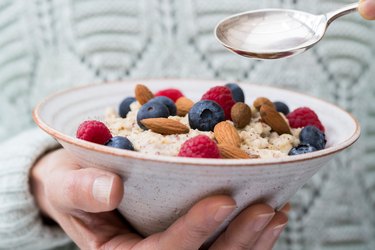
In his book "Eat Right 4 Your Type," Dr. Peter J. D'Adamo claims you can boost your health and reduce your susceptibility to disease by adhering to a diet based on your blood type. He recommends individualized eating patterns based on the ABO blood types. His dietary recommendations for type O are the same, regardless of whether you're O negative or O positive. Keep in mind that clinical data to support the theory of diets based on blood type is lacking.
Blood Type Premise
Video of the Day
Your blood type provides an evolutionary marker that determines the foods you thrive best on and the foods you'd do best to avoid, according to D'Adamo. He theorizes that your body is inherently meant to thrive on a diet closely resembling that of your ancestors of the same blood type. Researchers performed a systematic review to determine whether evidence exists to support this theory. After reviewing published data, researchers concluded that no evidence currently exists to support the theory of blood type diets, according to results published in "The American Journal of Clinical Nutrition" in July 2013. The researchers called for further study.
Video of the Day
Type O: The Hunter
Because type O is the oldest blood type, D'Adamo claims you thrive best on a hunter-gatherer diet which is high in protein and low in carbohydrate. This type of diet is commonly referred to as the Paleo diet since it mimics the purported eating patterns of the earliest humans, alive during the paleolithic era, or the "stone age." Hunters and gatherers lived a nomadic life, traveling from place to place, hunting wild animals and gathering edible plants.
Best Foods for Type O
As someone with type O blood, you're an inherent meat eater, according to D'Adamo. You thrive best on animal protein from meat, poultry and fish. He recommends that type Os of African descent emphasize lean red meat and game meat over fattier meats. D'Adamo recommends healthy oils such as olive oil for all individuals with type O blood. Other beneficial foods for type O include nuts and seeds and fresh fruits and vegetables. He states that those with type O should avoid dairy, cereal grains and legumes.
What the Experts Say
The NYU Langone Medical Center points out the restrictive nature of the type O recommendations. In particular, the type O diet eliminates entire food groups that are otherwise healthy, such as dairy, legumes and grains. If you eliminate entire food groups, you might miss out on certain vitamins, minerals and other vital nutrients, warns the Langone Medical Center. Because of this and the lack of scientific evidence, the Langone Medical Center recommends against following this type of diet.